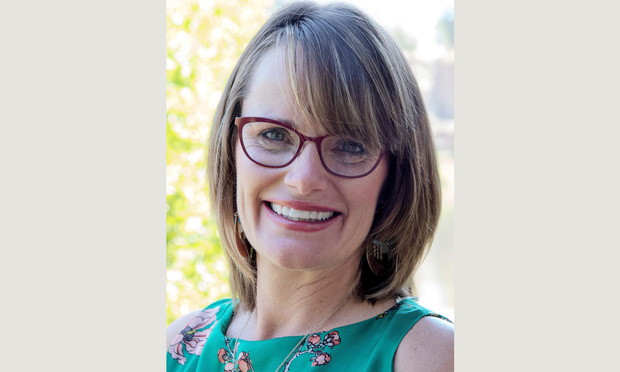1 Year As a Cannabis General Counsel: A Q&A With Jennifer Clifton of Orchid Ventures
"I think the hardest part is trying to navigate the cannabis laws in each state with all of them being so different and they're changing all of the time," Clifton says on her first year as a cannabis company's general counsel. "You have to be really agile as a company to be able to adapt quickly."
May 31, 2019 at 04:33 PM
4 minute read
 Jennifer Clifton, general counsel of Orchid Ventures Inc.
Jennifer Clifton, general counsel of Orchid Ventures Inc.
Jennifer Clifton was hired in June 2018 as the first general counsel of Orchid Ventures Inc., the Costa Mesa, California-based cannabis company. In the last year she's helped the company go public on the Canadian Securities Exchange and is currently helping Orchid expand its brand further into the U.S.
Orchid, which already operates in Canada, California and Oregon, announced its plans earlier this month to expand to Nevada, Washington, Florida, Michigan and Massachusetts.
For now, Clifton is the sole in-house lawyer at Orchid and said she expects the legal department to grow with the company. Clifton spoke with Corporate Counsel about some of the challenges of being general counsel at a cannabis company.
This conversation has been edited for clarity and length.
Corporate Counsel: What influenced your decision to go in-house at Orchid over keeping your private practice?
Jennifer Clifton: I love being part of a team and collaborating with the executive management team. The idea of being a part of a team that is creating a global cannabis brand just spoke to my passion for entrepreneurism. I've started a few companies on my own, and I love that creation process. Being able to give that legal expertise on business strategies is extremely interesting to me.
It has been an extremely interesting time. In Canada, the cannabis industry is sort of like how the dot-com industry was in the U.S. with the explosion of cannabis companies going public.
CC: What have been the challenges you've faced over the last year working in-house at Orchid?
JC: I was brought on to help Orchid go public in Canada. We completed our reverse takeover and became a public entity in Canada in March. The bulk of the projects I've been working on involved getting Orchid public on the Canadian stock exchange and confronting tax issues and international law issues.
Another issue that is really challenging for our industry is getting [directors and officers] insurance. It's hard to attract qualified directors if you can't get D&O insurance. Other issues that came up in each state are getting licenses and making decisions on whether or not to vertically integrate. All of those major issues are supply chain issues, and it's extremely challenging when every jurisdiction has a different set of rules.
While we were going through this whole process, Canada made cannabis legal. It's been very interesting to watch the industry unfold and see how companies are positioning themselves.
CC: Orchid is expanding into five states in the U.S. What are some of the challenges that come with that kind of expansion?
JC: What we're doing is licensing our brand to manufacturers and distributors that are licensed within that state. We're not actually going to be transporting any cannabis products. We can get a trademark to protect our brand but we're not getting a trademark on the cannabis itself.
The real issues come down to making sure you find partners that you can trust. You need to make sure the people you go into business with are professionals and that they can execute on the terms of the agreements that you negotiate. You need to make sure you have enough capital to meet demands and making sure you can get your products through the supply chain.
It's all of the issues that regular businesses deal with, but then you add an extra layer of compliance requirements. I think the hardest part is trying to navigate the cannabis laws in each state with all of them being so different, and they're changing all of the time. You have to be really agile as a company to be able to adapt quickly.
CC: Has there been anything to help you navigate these issues over the last year?
JC: Along the way I built a friendship with Lisa Sergi who used to be the general counsel at MedMen. That has been really helpful. I've also become friendly with John Magliana who is the general counsel of Golden Leaf. I also joined a cannabis general counsel group based in Toronto which was started by Sony Gokhale [the general counsel of the cannabis company Supreme]. It was really awesome because I could get support and help from colleagues who are in the same space.
This content has been archived. It is available through our partners, LexisNexis® and Bloomberg Law.
To view this content, please continue to their sites.
Not a Lexis Subscriber?
Subscribe Now
Not a Bloomberg Law Subscriber?
Subscribe Now
NOT FOR REPRINT
© 2025 ALM Global, LLC, All Rights Reserved. Request academic re-use from www.copyright.com. All other uses, submit a request to [email protected]. For more information visit Asset & Logo Licensing.
You Might Like
View All
From Reluctant Lawyer to Legal Trailblazer: Agiloft's GC on Redefining In-House Counsel With Innovation and Tech
7 minute read
People and Purpose: AbbVie's GC on Leading With Impact and Inspiring Change
7 minute read
From Olympic Aspirations to Legal Innovation: Tom Dunlop's Journey to Founding Summize
8 minute read
'Am I Spending Time in the Right Place?' SPX Technologies CLO Cherée Johnson on Living and Leading With Intent
9 minute readTrending Stories
- 1Public Notices/Calendars
- 2Wednesday Newspaper
- 3Decision of the Day: Qui Tam Relators Do Not Plausibly Claim Firm Avoided Tax Obligations Through Visa Applications, Circuit Finds
- 4Judicial Ethics Opinion 24-116
- 5Big Law Firms Sheppard Mullin, Morgan Lewis and Baker Botts Add Partners in Houston
Who Got The Work
J. Brugh Lower of Gibbons has entered an appearance for industrial equipment supplier Devco Corporation in a pending trademark infringement lawsuit. The suit, accusing the defendant of selling knock-off Graco products, was filed Dec. 18 in New Jersey District Court by Rivkin Radler on behalf of Graco Inc. and Graco Minnesota. The case, assigned to U.S. District Judge Zahid N. Quraishi, is 3:24-cv-11294, Graco Inc. et al v. Devco Corporation.
Who Got The Work
Rebecca Maller-Stein and Kent A. Yalowitz of Arnold & Porter Kaye Scholer have entered their appearances for Hanaco Venture Capital and its executives, Lior Prosor and David Frankel, in a pending securities lawsuit. The action, filed on Dec. 24 in New York Southern District Court by Zell, Aron & Co. on behalf of Goldeneye Advisors, accuses the defendants of negligently and fraudulently managing the plaintiff's $1 million investment. The case, assigned to U.S. District Judge Vernon S. Broderick, is 1:24-cv-09918, Goldeneye Advisors, LLC v. Hanaco Venture Capital, Ltd. et al.
Who Got The Work
Attorneys from A&O Shearman has stepped in as defense counsel for Toronto-Dominion Bank and other defendants in a pending securities class action. The suit, filed Dec. 11 in New York Southern District Court by Bleichmar Fonti & Auld, accuses the defendants of concealing the bank's 'pervasive' deficiencies in regards to its compliance with the Bank Secrecy Act and the quality of its anti-money laundering controls. The case, assigned to U.S. District Judge Arun Subramanian, is 1:24-cv-09445, Gonzalez v. The Toronto-Dominion Bank et al.
Who Got The Work
Crown Castle International, a Pennsylvania company providing shared communications infrastructure, has turned to Luke D. Wolf of Gordon Rees Scully Mansukhani to fend off a pending breach-of-contract lawsuit. The court action, filed Nov. 25 in Michigan Eastern District Court by Hooper Hathaway PC on behalf of The Town Residences LLC, accuses Crown Castle of failing to transfer approximately $30,000 in utility payments from T-Mobile in breach of a roof-top lease and assignment agreement. The case, assigned to U.S. District Judge Susan K. Declercq, is 2:24-cv-13131, The Town Residences LLC v. T-Mobile US, Inc. et al.
Who Got The Work
Wilfred P. Coronato and Daniel M. Schwartz of McCarter & English have stepped in as defense counsel to Electrolux Home Products Inc. in a pending product liability lawsuit. The court action, filed Nov. 26 in New York Eastern District Court by Poulos Lopiccolo PC and Nagel Rice LLP on behalf of David Stern, alleges that the defendant's refrigerators’ drawers and shelving repeatedly break and fall apart within months after purchase. The case, assigned to U.S. District Judge Joan M. Azrack, is 2:24-cv-08204, Stern v. Electrolux Home Products, Inc.
Featured Firms
Law Offices of Gary Martin Hays & Associates, P.C.
(470) 294-1674
Law Offices of Mark E. Salomone
(857) 444-6468
Smith & Hassler
(713) 739-1250






